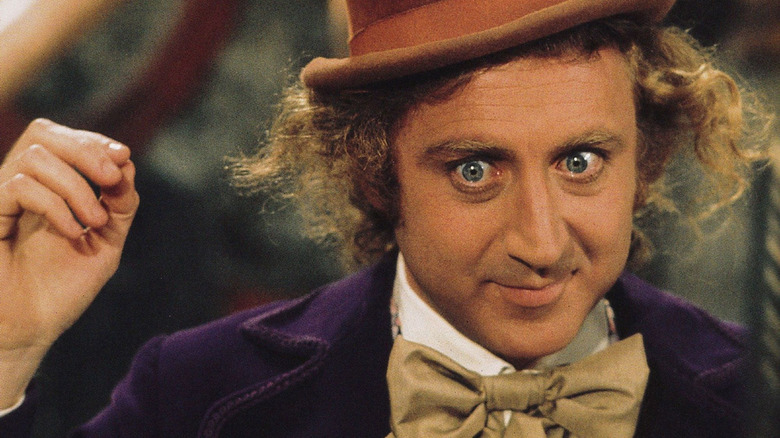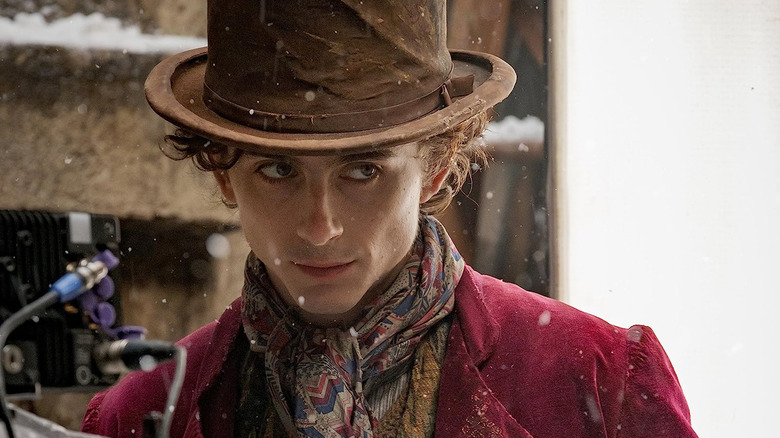Timothee Chalamet's Wonka Prequel Is In Canon With The Gene Wilder Film
Willy Wonka, the amazing chocolatier renowned for his incredible candies, dodging labor laws, and endangering who knows how many children's lives, is returning to the screen in "Wonka." The film stars Timothée Chalamet as a much younger Willy Wonka than the one in Roald Dahl's 1964 novel "Charlie and the Chocolate Factory," years before he recruited an army of Oompa-Loompas to produce his one-of-a-kind confections. That and battling human-snacking aliens like something out of a John Carpenter film in outer space. (Things got pretty strange in Dahl's sequel book, "Charlie and the Great Glass Elevator.")
"Paddington 1 & 2" director Paul King is behind the camera on "Wonka," drawing from a script he co-wrote with his "Paddington 2" scribe Simon Farnaby. Hiring the duo behind one of the most wonderfully kind-hearted and witty films in recent memory is certainly an effective approach to convincing people there might be more to this prequel about a famous character whose origin story never seemed remotely interesting than brand recognition. That and "Wonka" is a proper musical! It's as though this film is deliberately trying to target someone like me, i.e. those who otherwise wouldn't have bothered to pay attention to a Willy Wonka origin story. Honestly, I feel kind of attacked.
It does beg the question, though: exactly which Willy Wonka is "Wonka" an origin story for? The one in Dahl's original book? The Gene Wilder version in director Mel Stuart's 1971 film "Willy Wonka and the Chocolate Factory?" The Johnny Depp Wonka in Tim Burton's "Charlie and the Chocolate Factory" movie adaptation? According to King, his film is specifically in canon with — not surprisingly — Stuart's widely-beloved musical fantasy, as opposed to the book written by a notorious antisemite or the movie starring an alleged domestic abuser.
Come with me and you'll be In a world of pure continuity
The iconography from Mel Stuart's film has become all but synonymous with the Willy Wonka character over the last 50-plus years, even more so than the illustrations from the different editions of Roald Dahl's source material (with Quentin Blake's artwork being the best-known these days). It's why Paul King declined to re-imagine Stuart's specific rendition of the Wonka universe, much less break away from its continuity. As he told Entertainment Weekly:
"I didn't want to reinvent those things 'cause it felt like that '71 movie had come up with these incredibly enduring, iconic looks. What I wanted this movie to be was like a companion piece to that movie. If you imagine those people in that world 25 years earlier, that was my starting process. Eventually, he would grow into that person and that factory."
This aligns with the first-look footage and images released from "Wonka" so far. Timothée Chalamet doesn't dress exactly the same way Gene Wilder did as Willy Wonka (in fact, he dresses a bit more like Gonzo in "The Muppet Christmas Carol"), but he's got the same top hat, brightly colored jacket, and twirling cane ensemble. In keeping with this approach, Hugh Grant as an Oompa-Loompa has the same somewhat nightmare-inducing white eyebrows, orange skin, and curly green hair as the ones from "Willy Wonka and the Chocolate Factory." To be fair, that's still a major step up from the early, racist depiction of the Oompa-Loompas imagined by Dahl.
Can Chalamet's candyman charm a new generation while also winning over those who grew up watching Gene Wilder's iteration make mischief and commit near-manslaughter bordering on negligent homicide? We'll find out when "Wonka" dances its way into theaters on December 15, 2023.

